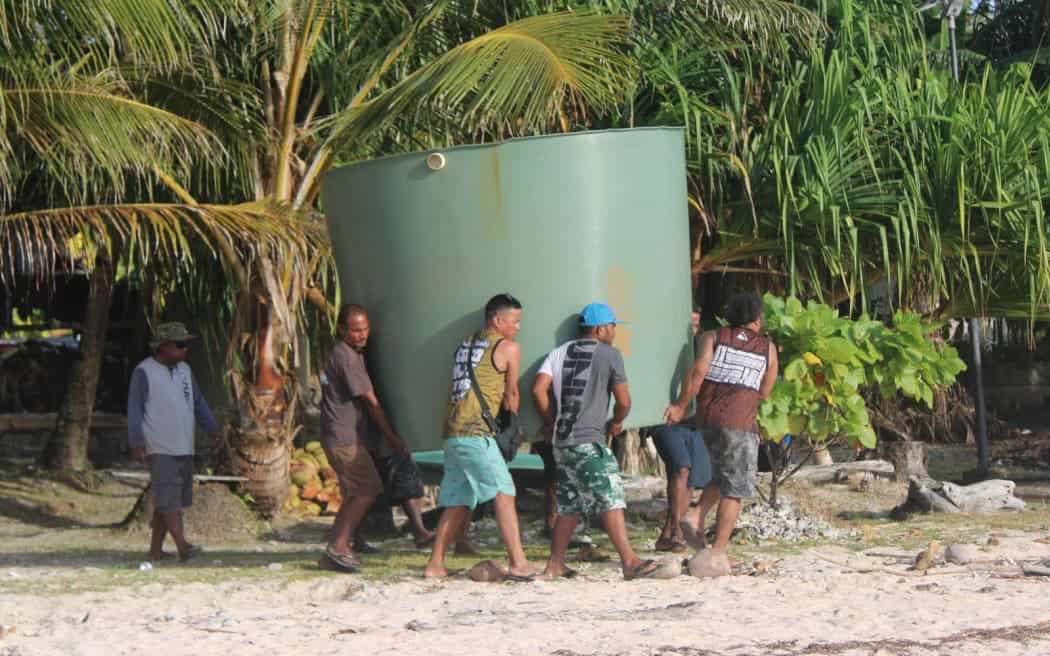Extreme droughts in the Western Pacific region are expected to persist over the next three months.
Parts of the Marshall Islands, Guam, Palau, Mariana Islands, and the Federated States of Micronesia (FSM) are now designated under extreme and exceptional drought.
These conditions are causing a massive strain on agriculture, water supply, and daily life for residents in FSM’s Yap Proper, the atoll of Wotje in the northern Marshall Islands, and other nearby islands in the Marshalls.
Guam weather service forecaster Joshua Schank told RNZ Pacific that while the region expected the last four months to be dry, the current El Niño weather pattern has intensified conditions.
“The rainfall across our region just kind of stopped for many places,” Schank said.
“Much less rain than they should get to be able to keep up water levels at a healthy level.”
The El Niño event, which brings wet weather to southern U.S states and the Gulf of Mexico, causes dry conditions in the Western Pacific often causing droughts.
“From December through January, February, and now March and April, parts of Micronesia have experienced very little rainfall, even compared to normal, for the dry season,” Schank said.
The last El Niño event recorded in the region was in 2015.
The forecaster explained these weather patterns are becoming more difficult to predict, with each El Niño event responding differently.
“Other factors contribute to the strength of other (weather) patterns such as the Madden Julian Oscillation (MJO), the Indian Ocean Dipole, or other climate patterns that help influence and affect how the El Niño develops during each year.”
Residents across the region have reported agricultural strain, with staple crops such as taro patches yellowing and coconuts drying up.
The region was also hit with a king tide and trade winds last month, which caused crop damage across the Marshall Islands and the FSM.
The United Nations Children’s Fund (UNICEF) has labeled the situation dire. An estimated 16,000 people, 40 percent of those being children, need food and water.
RNZ Pacific correspondent in Guam, Naina Rao, said the water supplies have all but run out.
“Some of these islands’ community water tanks are broken, and water wells are low,” Rao said.
“As a result, they’re running low on drinking water because of these water shortages.”
Access to communication and the internet in Guam is only possible when aid ships arrive on the island. RNZ Pacific spoke to Guam resident Larry Raigetal, who is from the island of Lamotrek in Yap.
Raigetal said he last spoke to his family in Yap a week ago, who told him the residences were ‘limiting and rationing as best as they can.’
“They are using water only, when necessary, people are reserving a lot,” he added.
“Some people are bathing in the lagoon, in the ocean just to avoid having to use fresh water.”
The weather service also warned of the ‘threat of wildfires.’ A major wildfire, early this month, destroyed five acres of a popular outdoor recreation park on Cocos Island, in Guam.
While the authorities were investigating the situation, RNZ Pacific correspondent Rao spoke with the weather office, who confirmed the fire ‘was related to the very dry conditions of the region.’
Wildfires have also been reported in Palau, Yap in FSM, and Pohnpei in the Marshall Islands.
Throughout the prolonged drought response efforts have been carried out by the disaster coordinating offices, out of FSM and the National Disaster Management Office in the Marshall Islands.
Several relief vessels have also supplied water, food, as well as reverse osmosis (RO) units; water purification systems capable of producing 360 litres of clean water per day.
A number of international humanitarian organisations have become involved in the situation, including; Catholic Relief Services, the U.S Agency for International Development (USAID), UNICEF, and the UN’s International Organisation for Migration.
A week ago, at the request of the U.S Embassy, the United States Coast Guard delivered drought relief supplies to the most affected areas.
The Australian vessel Reliant was dispatched with 116,000 litres of fresh water, for drought response in Pohnpei earlier this month.
While the relief will be welcomed by the residents, droughts have become a part of life in this region.
Guam resident Larry Raigetal said, ‘I’ve been through several droughts growing up in the region’.
He added the reliance on community and having a community-first-thinking approach has helped with resiliency during tough times.
“It’s not about oneself. It’s not about me, it’s about the person next to me, and it’s about everybody else,” he said.
“So, when you have a community structure that sees the well-being of everybody, then chances are we’re going to work together to ensure survival in the long run.”
Over the next week, parts of Yap State in FSM and Palau are hoping to see some much-needed rain.
There is also the possibilty of rainfall across Chuuk, Pohnpei, Kosrae States, and other parts of the Marshall Islands.
However, not all of Mirconesia will benefit from the projected rainfall. Other islands in FSM, like Yap Proper, Ulithi, Faris in Yap State, Wotje, and other atolls in the northern Marshall Islands may not receive any rain. The Marianas Islands will also see worsening drought due to ongoing dry conditions.
